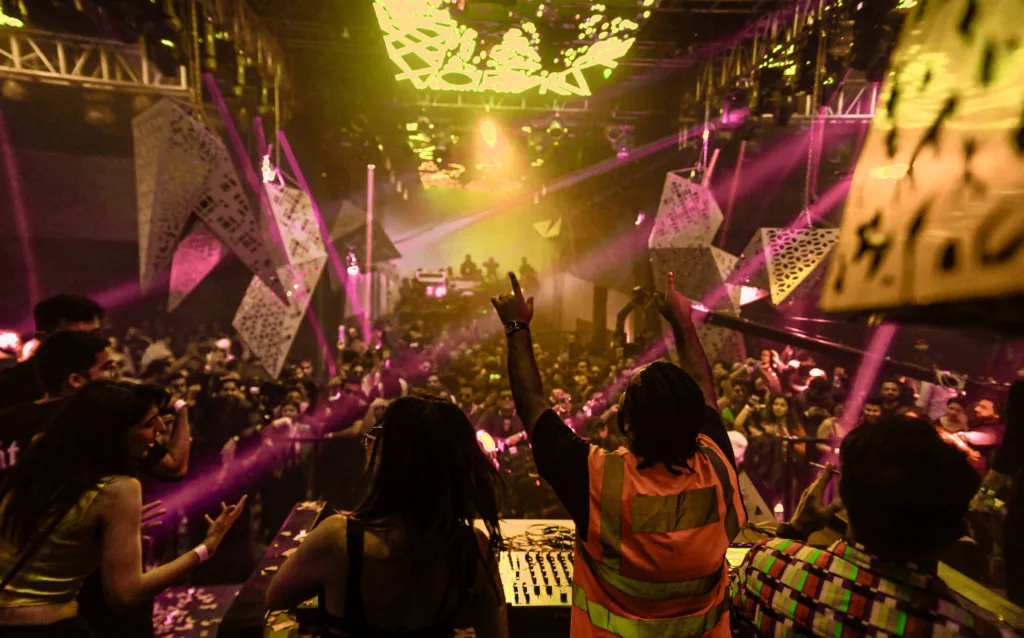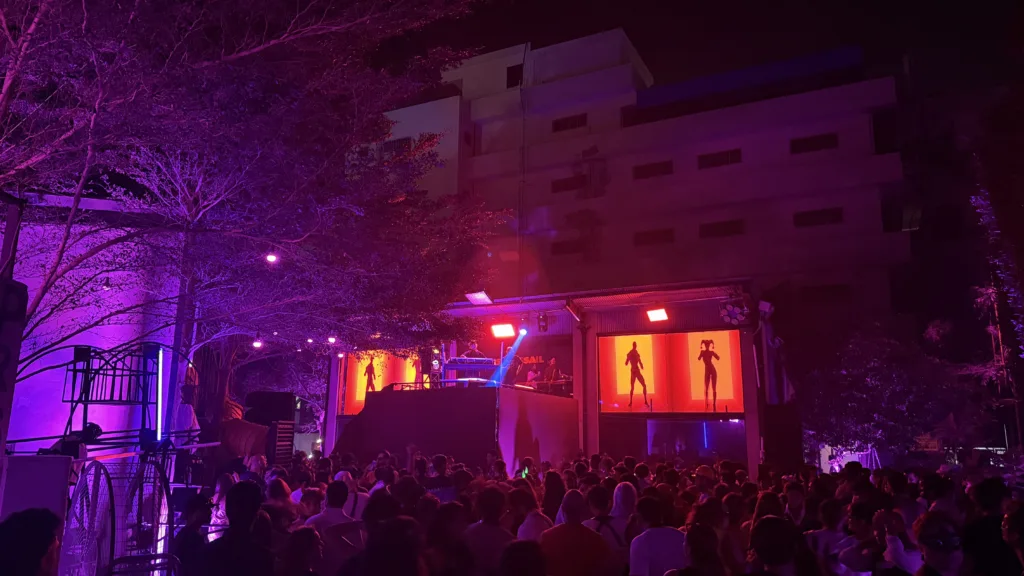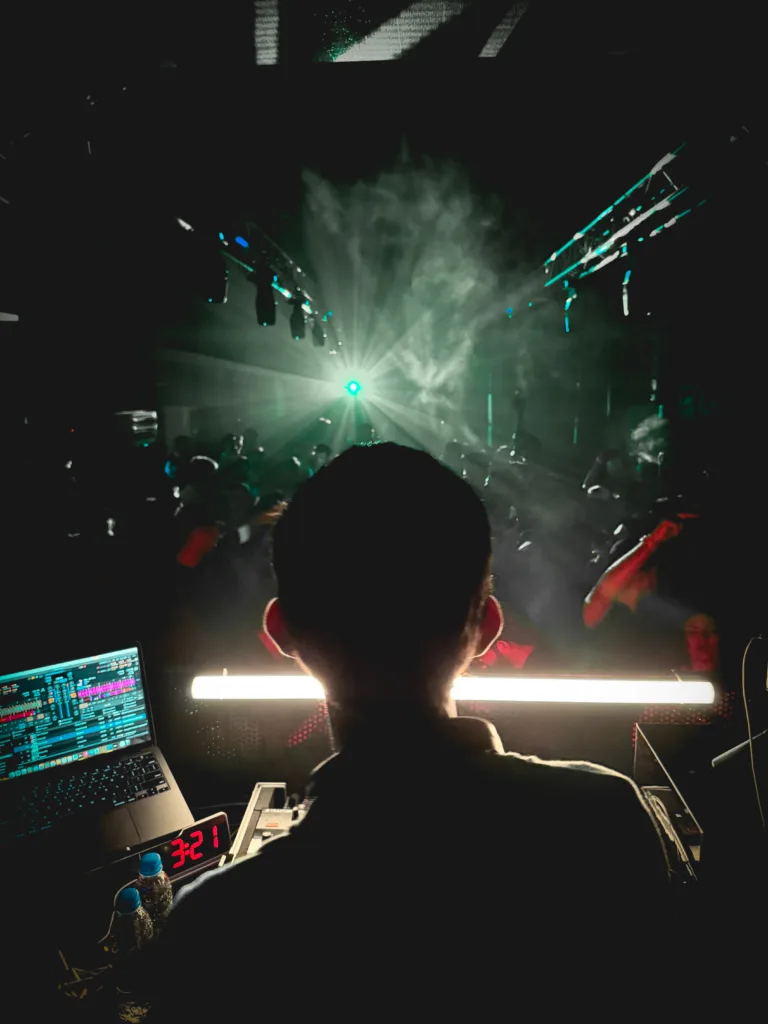 Posted in
Life & Culture, Music
Posted in
Life & Culture, Music
The kids are alright
Text Samia Qaiyum
It’s the year 2025, and the youth of Karachi are raging to a samosa. Conceptualised by Mr Shotbox, who’s spinning the decks in a ‘Make Raves Great Again’ tee, Pakistan’s first-ever audiovisual show is in full swing, complete with a 52-foot screen—think Anyma’s The End of Genesys, but with coruscating lights and hyperrealistic graphics peppered with the country’s self-deprecating and undeniably self-aware sense of humour.




It’s the same sensibility that, soon after, would translate into the meme-ification of war. In the weeks leading up to Operation Sindoor, young Pakistanis famously responded to India’s threats of military strikes in the same way they do to any other crisis: inane jokes that poke fun at their country’s problems.
Just don’t call these kids ‘resilient’.
“Every time there’s a narrative about the nightlife of Pakistan, it’s never really about the people who are making music nor the events they’re hosting. And it’s never really about the art being created,” says Daniel Arthur Panjwaneey, who started as a bassist in a thrash metal band and now goes by the stage name Alien Panda Jury. Having created both Cape Monze Records and the Oscillations event series to support and build upon the underground music ecosystem, he is no stranger to the sensationalism of Pakistani creatives and their many structural and societal struggles—“pity porn” as he puts it.
The 2024 documentary Karachi at Night comes to mind. What started with the objective of showcasing the strength of the city’s underground dance music culminated into 14 minutes’ worth of soundbites that fixate on the effort it takes to throw a party in a ‘third-world country’. “I gave a little history lesson about everything we’ve done, but at the end of the day, it still felt like, ‘Oh, I feel sorry for these people because they have it so difficult. But, wow, are they resilient.’ The narrative needs to get past the glorification of our resilience,” reflects Panjwaneey, among the artists interviewed for the Resident Advisor film.
“If you’re covering music from Pakistan, it should be doing a service to the skill, maybe leading to a promoter to book the featured talent,” he continues. “Because the amount of music that’s being made? There’s some world-class stuff out here—producers like Sid and Malik and Rudoh and Tollcrane are making such great music that’s being played by the global underground, too. There’s so many people across Europe and America and the UK who are playing our music, but we’re not getting booked there.”
As for when those booking enquiries do come through? Art may know no borders, but the same doesn’t hold true for the artists creating it. “A promoter recently reached out to me asking, ‘Will you be in Europe next month?’ I was like, ‘No, why would I be?’ It’s not like I have a passport that allows me to just get up and go.” At a time when cross-cultural exchange is shaping music as we know it, access to the outside world remains an uphill battle for Pakistan’s underground artists.
At the time of writing, the country’s passport is ranked the fourth weakest in the world, trailing ahead of only Iraq, Syria, and Afghanistan. “If they want to book me, they have to make the enquiry at least six to eight months in advance and then do the paperwork in order for me to get that visa, right? But no one wants to go through all that khwari [effort that usually proves futile].”
What happens, then, is that the Pakistani diaspora ends up representing the underground scene on the global stage. “It isn’t maybe a true representation, either,” adds Panjwaneey. “I have nothing against people like Ahadadream and ZeeMuffin. They’re successful Pakistanis who are touring the world, but we do have our own identity. We have our own sound as native South Asians living in South Asia, and still not getting booked for festivals.”
Bilal Brohi, hailed as a progressive house legend in Pakistan, echoes the sentiment. “Whether it’s art, poetry, production, or songwriting, we have phenomenal talent—but it needs to be nurtured. Exchange programmes obviously go a long way in collaboration. That’s why we invite people from abroad to perform, and everyone who comes down here absolutely loves it because people are famished, and their response is mental. We try to do the same, of course, but Pakistani passports don’t exactly make it easy,” he says with a scoff.
“I will tell you one thing,” he adds. “Shitty circumstances make for great art. If you go to a developed part of the world, you’ll encounter creatives who are searching for inspiration. They’re seeking their muse. Here, you can pick up a rock and find an artist beneath it because they have so much to say, but don’t have the infrastructure for it.”
Partying in Karachi – while not technically illegal – is complicated, as Brohi explains. “You gotta set a night up from scratch and a lot goes into it. I mean, everything that’s linked to nightlife somehow has something to do with intoxication, right? So, like everywhere else in the world, there’s either alcohol or drugs—that’s just how it is. And because of the ban on alcohol in Pakistan, we don’t have clubs because it just wouldn’t work. There’s concerts for commercial bands and stuff, and raves for underground house music or whatever part of the subculture you’re into.”
Setting up a rave for anywhere between 200 and 500 people, for starters, is usually a self-funded endeavour for Brohi and his peers. “It’s tricky, man. Every event is held outdoors, which means you’re pretty much taking over an empty piece of land. You’re trying to secure the compound and get permission from the authorities. You’re then setting up your trusses, your lights, and a big PA system. You’re also arranging security, building a ticketing system, and renting a generator because of power cuts, which further racks up the costs. And this is all while putting the word out yet maintaining some level of selectivity.”
From the outside, partying in Pakistan’s biggest and most diverse city presents another unexpected dynamic. At odds with the very essence of electronic music, one that’s deeply rooted in inclusivity, raves here are reserved for the elite—or progressive, music-savvy Gen Zers born into privilege, at least. “No, not quite,” argues Brohi. “Allowing just about anyone inside would be very uncomfortable for the people who want to let loose. Stigmas attached to clubbing means the wrong crowd will either sit there and judge you, or wonder what the hell is happening.” Underground gigs are therefore never advertised, marketed instead as private, invite-only events, with attendees vetted by necessity in order to keep troublemakers off dancefloors.
Just ask Hira Haq of District 19. Located in the industrial area of Korangi, the creative hub recently marked five years since its inception, helping make up for the dire lack of physical spaces where like-minded people could come together and hosting everything from art workshops and film screenings to game nights and stand-up comedy shows. But if a quick internet search is to be believed, District 19 only came to the fore when its Halloween 2024 party went awry.
On paper, a police raid abruptly halted the event over claims that “vulgar activity” violated the terms and conditions stated in the deputy commissioner’s NOC. In reality, however, it boiled down to a politico who was denied entry and subsequently generated a mob, riling up passersby by way of accusations that would inevitably endanger the revellers inside—fahashi (indecency), blasphemy, and satan worship included. “This felt like a target not only on District 19, but also a space that drives creative expression,” reveals its co-founder. “Besides fulfilling all legal requirements and obtaining necessary documents weeks in advance, the NOC was cancelled without any proof or notification from the authorities.”
Nevertheless, Haq and co persist. Considering District 19 is one the few independent community spaces for open dialogue in this perpetually troubled metropolis, she is determined to carry on. “For now, at least, we have no future. And we’re never going to have the club culture that’s the norm abroad,” she says wryly. “But we’re still doing it. Even in the case of political strikes and a crashing economy, events are booming—we need to shut off. ‘Things will fall apart on Monday, but Saturday and Sunday? We need an escape.’ That’s the Karachiite way.”
Warehouses, basements, beaches, obscure farmhouses, residential rooftops, coffee shops, and even gyms—it’s no wonder they all moonlight as nightlife venues in a city with 20.3 million residents and essentially zero bars or clubs. The aforementioned AV show, for example, marked a milestone in Karachi’s nightlife landscape at an interactive science museum of all places.
“I sometimes wonder how it would’ve been if Zia’s Islamisation never came in the 80s,” muses Mr Shotbox, whose real name is Hamza Haris. “I feel the 80s would’ve been a vibe if we didn’t crash and burn in someone else’s war,” he says, referring to Muhammad Zia ul-Haq’s dictatorship and how it steered religious radicalisation, drastically altering the course of the country. In fact, the once-freewheeling nightlife scene of Karachi still holds a place of nostalgia in the collective memory of baby boomers across the city—a time when casinos, clubs, bars, and discotheques were packed with everyone from hipster types to foreign diplomats as the likes of Dizzy Gillespie and Duke Ellington took the stage.
It is the golden era that the 27-year-old has never witnessed, but is adamant to bring back. “I’m either blessed or delusional, I don’t know,” he says, shrugging. “But I keep going. And I refuse to tell a sob story about not getting enough support from authorities. What I do want to emphasise is the renewed sense of hope. There’s a renewed sense of energy. Gen Z is coming in hard and, with everything we’re facing, they won’t listen to anyone. I mean, your politics is screwed. Your economy is screwed. You’re on the brink of collapse, Balochistan might secede—things have gotten so bad that all of Gen Z has their middle fingers up. What people should focus on is how things went so wrong that all the kids are like, ‘F*ck it, it’s time to party.’”
The end goal, says Haris, is a sustainable nightlife model that more conservative cities – Multan, Faisalabad, Peshawar – across Pakistan can eventually adopt. “Things will get better when that movement gets going. And I don’t need the credit for it. I just need to know that it’s done because it’s very personal to me. I’ve been sued, my physical safety has been compromised, and I’ve burned enough money. I’ve put my twenties, my resources, everything I have into this stupid dream of making sure that the party comes back to Karachi.”
